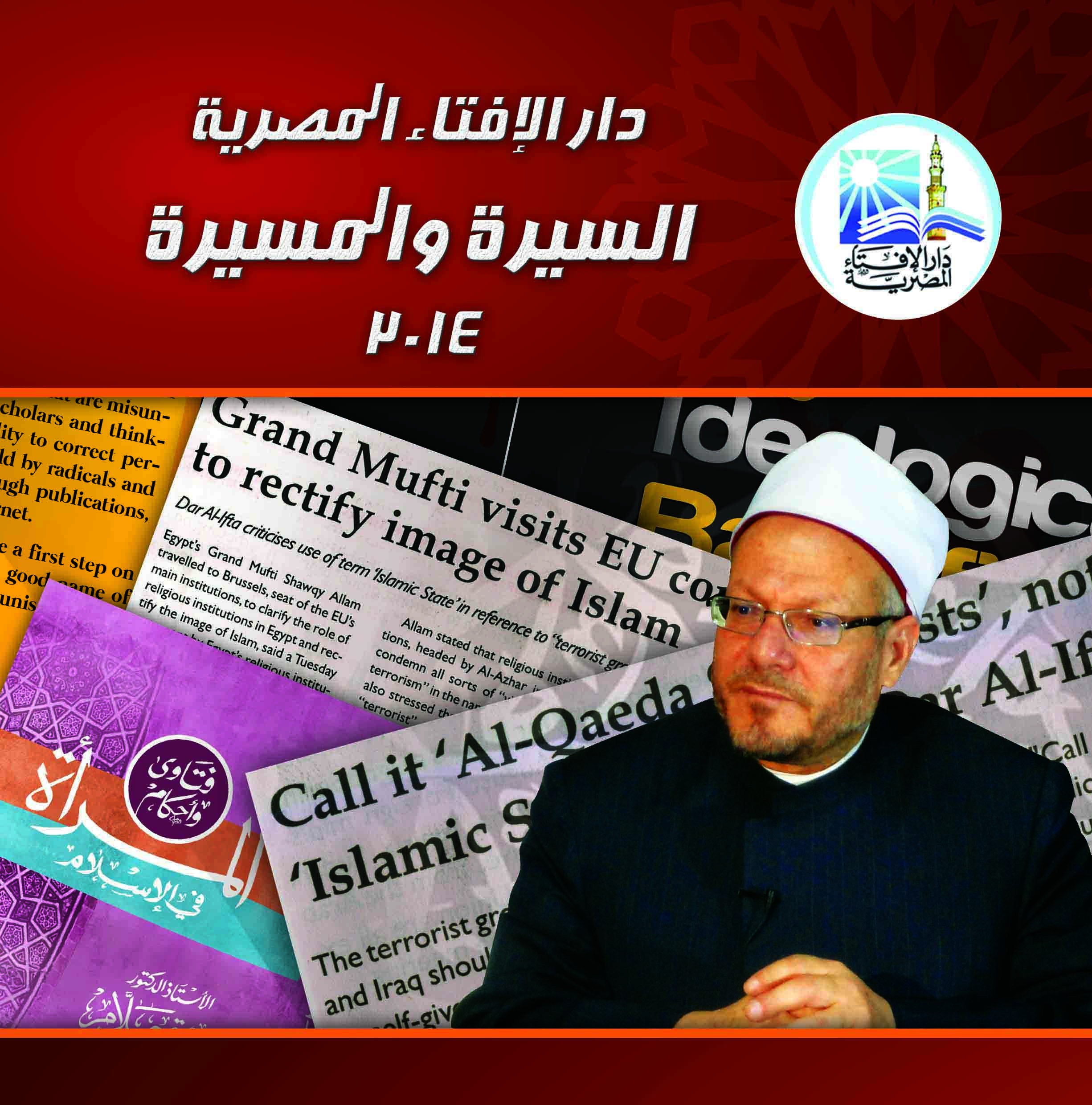Dar al-Iftaa publishes a book to register its efforts in confronting radicalism 2014

Dr. Shawki Allam, the Grand Mufti of Egypt, stated in the introduction of the book that Dar al-Iftaa has sensed the danger of infedilizing fatwas and extremism on the community through conducting a number of researches and studies that analyze the religious affair both domestically and internationally. Therefore, Dar al- Iftaa took many steps towards combating radicalism and he added that Dar al- Iftaa adopted a disciplined scholarly strategy which is based on two perspectives. The first perspective focuses on the adopted methodology through establishing an infedilizing fatwa observatory for tracking and refuting the false claims of the extremists. And further spreading public awareness related to these distorted concepts and erroneous beliefs in order to dry up the springs of these extremist groups.
The Grand Mufti stressed that the second perspective deals with the actual world, through launching a campaign for spreading true awareness by spending notable scholars to different regions that are afflicted by such ideologies and extremist groups in and outside Egypt. However, Dar al- Iftaa has achieved the expected results from these tours which contributed efficiently in correcting the distorted image attached to Islam as result of the practices of these extremist groups.
The book explains that Dar al- Iftaa has established the infedilizing fatwa observatory for tracking and analyzing the infedilizing fatwas on basis of a disciplined Islamic methodology which takes the factors of time and place for issuing a fatwa into consideration. It further provides a comprehensive Islamic explanation and objective approach.
The book lists the scholarly publications issued by the infedilizing fatwa observatory which tackle and refute the false claims of these terrorist organizations.
The book states that the infedilizing fatwa observatory has issued many reports, the first on the impact of politics on infedilizing fatwas and the chaos of issuing fatwas. The second report tackles the infedilizing methodology and its adopted principles. The third report tackles the impact of infedilizing fatwas on the image of Islam in the west and the fourth report discusses the increase in foreign fighters joining the ranks of Qa’ida separatists.
The infedilizing fatwa observatory has issued another report which discusses the verses of fighting in the holy Qur`an being politically implemented by terrorist groups. Furthermore, a report tracks the crimes committed by the terrorist organization “QSIS” against women in the name of Islam and refutes the evidences they derive for legitimizing their practices.
The book further registers the efforts exerted by the Grand Mufti and the scholars of Dar al-Iftaa in confronting radicalism in many levels. The first was through conducting many television interviews in different domestic and international mass media throughout the year. The book mentions the explicit position adopted by the Grand Mufti towards terrorist operations, killing the innocent and targeting police and army personnel.
The book has further mentioned the practical procedures adopted by Dar al-Iftaa in confronting radicalism through launching an international campaign in the western media for dropping the acronym “Islamic State” and replacing it with “Qa’ida Separatists”.
Dar al- Iftaa further launched an online campaign to drop using this acronym and started a Facebook page in both Arabic and English for refuting the claims of QSIS and launched a twitter hashtag for this purpose.
The book further shows the efforts exerted by the Grand Mufti of Egypt in improving the image of Islam and Muslims internationally through undertaking a number of worldwide tours. The most important among them was visiting the European Parliament headquarters which is considered its first time to host an Egyptian religious scholar for discussing the role undertaken by the religious institutions in correcting the image of Islam.
Furthermore, the call by the Grand Mufti through the Belgian newspaper “La Libre Belgique” to establish dialogue between the Muslims and the west based on acknowledged principles
Moreover, the book covered the successful visit of the Grand Mufti to Vienna and participating in the conference organized by King Abdullah International Center for Interreligious and Intercultural Dialogue (KAICIID).
In the US, Dr. Ibrahim Negm, the senior advisor to the Grand Mufti, launched an international campaign for correcting the image of Islam in the west as he met with the editorial panels of the Newsday and New York Times.
The book mentions publishing a guide by the Media center at Dar al-Iftaa as one of its efforts in correcting the distorted image of Islam caused by the practices of the terrorist groups QSIS and Boko Haram.
This is in addition to sending the first fatwa convoy to the west of Africa which includes notable scholars of Dar al-Iftaa for correcting the distorted image of Islam and combating radicalism.
Dar al-iftaa issued many English publications; the most important among them was the book under the title “The Ideological Battlefield” which refutes radicalism and claims adopted by QSIS and other terrorist organizations.
Domestically, Dar al- Iftaa signed cooperation protocol with the Egyptian Youth Ministry for preparing a generation of Islamic youth adhere to Islamic moderation and shun radicalism.
 Arabic
Arabic French
French Deutsch
Deutsch Urdu
Urdu Pashto
Pashto Swahili
Swahili Hausa
Hausa
